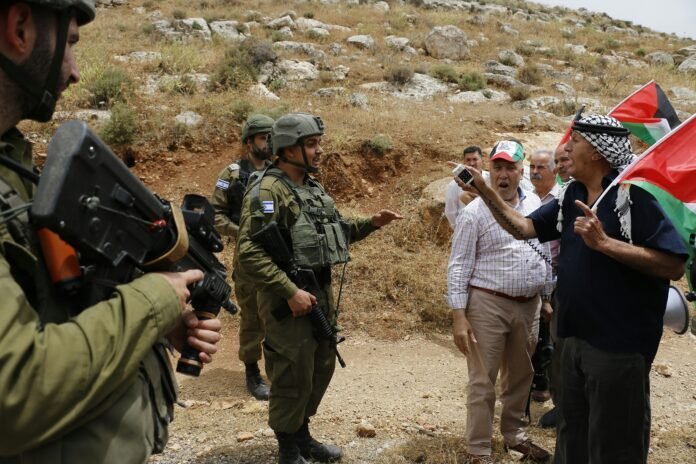Introduction to Resolution 2803
On September 17, 2025, the United Nations Security Council adopted Resolution 2803, a pivotal step towards addressing the intricate challenges associated with the Gaza conflict. This resolution emerges in a context marked by prolonged instability and humanitarian crises in the region. The adoption of Resolution 2803 not only signifies an urgent response to escalating tensions but also reflects the international community’s commitment to facilitating a framework for stabilization and peace.
The voting results for Resolution 2803 revealed a landscape of international support, with 12 members voting in favor, while 3 countries abstained. The countries that supported the resolution recognized its potential to address the multifaceted issues affecting Gaza, including security concerns, humanitarian needs, and the underlying socio-political dynamics. On the other hand, the abstentions highlighted a divide in perspectives, illustrating concerns about the efficacy of international interventions and the complexities inherent in the Gaza situation. Such dynamics underscore the delicate balance the Security Council must navigate in its approach to conflict resolution.
Resolution 2803 is significant as it seeks to establish a comprehensive plan aimed at promoting stabilization within Gaza. This plan includes provisions for immediate humanitarian assistance, a framework for enhanced security cooperation among local actors, and steps towards long-term socio-economic development. By fostering dialogue and collaboration among stakeholders, the resolution aspires to create an environment conducive to lasting peace. The role of the UN in this context is crucial, as it emphasizes the importance of multilateral efforts to address the root causes of the conflict while ensuring the protection of civilian populations affected by ongoing violence.
Key Provisions of the Resolution
UN Security Council Resolution 2803 introduces a comprehensive framework aimed at fostering stabilization in Gaza, incorporating several critical provisions. Central to this resolution is the establishment of the ‘Board of Peace,’ which is tasked with overseeing the implementation of strategic initiatives aimed at restoring stability. This board, comprised of representatives from the international community, aims to facilitate dialogue between conflicting parties and ensure adherence to the outlined objectives.
Another pivotal aspect of Resolution 2803 is the creation of the International Stabilization Force (ISF). This force is designed to provide security and support for humanitarian efforts in Gaza, reinforcing the commitment of the international community to peacebuilding. The ISF will operate under a mandate that emphasizes protection for civilians and maintenance of public order, helping to create a secure environment conducive to the delivery of vital humanitarian assistance.
Resolution 2803 also sets forth strategic timelines for the withdrawal of Israeli Defense Forces from specific regions within Gaza. These timelines are aimed at ensuring a phased withdrawal that aligns with security assessments, thereby reducing tensions in the area. This commitment not only demonstrates a move towards de-escalation but also reinforces the importance of local governance and the stability needed for the establishment of a sustainable peace process.
In conjunction with security measures, the resolution highlights the urgent necessity for humanitarian aid to be delivered effectively to those in need. It outlines operational arrangements to facilitate such aid, ensuring that assistance reaches the affected populations without undue delay. This multifaceted approach signifies a commitment to addressing both the immediate humanitarian crisis and the long-term stabilization goals in Gaza.
International Reactions and Support for the Resolution
The adoption of UN Security Council Resolution 2803 has elicited a variety of reactions from countries around the world, reflecting differing perspectives on its potential implications for peace and stability in Gaza. Among the key proponents of this resolution, the United States emphasized the necessity for a collaborative framework that fosters dialogue between conflicting parties. They underscored that Resolution 2803 serves as a crucial step towards addressing the humanitarian crisis, mitigating violence, and ultimately paving the way for a prolonged peace process in the region.
Similarly, the United Kingdom expressed its strong endorsement of the resolution, highlighting that international cooperation is essential in supporting the peace initiatives set forth in Resolution 2803. British officials pointed out that the resolution could potentially lead to increased humanitarian assistance and encourage both Palestinian and Israeli leadership to return to negotiations, which is vital for achieving a lasting two-state solution. This sentiment is echoed in statements made by Algeria, which voiced its support for the resolution, framing it as an important tool to address the unique challenges faced by the Palestinian people and emphasizing the need for equitable treatment in the pursuit of peace.
Conversely, nations that chose to abstain from the voting, such as China and Russia, raised significant concerns regarding certain aspects of the resolution. Chinese representatives criticized the text for not sufficiently addressing the root causes of conflict and expressed apprehensions that the resolution might undermine the frameworks aimed at achieving a comprehensive two-state solution. Russia echoed similar sentiments, emphasizing that the absence of a clear commitment to the rights of Palestinian refugees and sovereignty poses fundamental challenges. These contrasting viewpoints illustrate the complexities of international diplomacy in the context of Gaza’s stabilization and further highlight the need for ongoing dialogue among nations to address regional conflicts effectively.
Concerns and Criticisms of the Resolution
UN Security Council Resolution 2803 aims to provide a framework for stabilization and peace in Gaza; however, its implementation has faced substantial scrutiny. Critics, including representatives from various nations, have raised concerns over the lack of clarity regarding governance roles within the proposed framework. There are apprehensions that ambiguities in the resolution may lead to misunderstandings among stakeholders, potentially jeopardizing the intended stability in the region.
One significant criticism focuses on the representation of Palestinian interests. Many observers contend that resolution 2803 falls short in ensuring meaningful participation of Palestinian voices in the decision-making process. The absence of a clear mechanism for Palestinian representation raises questions about the legitimacy of the resolution’s outcomes. Without adequate representation, the risk of alienating key demographic groups remains high, which could exacerbate tensions rather than foster peace.
Furthermore, the resolution gives prominence to the Israel Defense Forces (IDF) and the Israel Security Forces (ISF), sparking concerns that their involvement may unintentionally escalate existing conflicts rather than mitigate them. Critics argue that reliance on military forces in stabilization efforts can create a paradox where security measures may lead to increased hostility among the Palestinian populace, further complicating the peace process. The perceived potential for the ISF to impose security measures without addressing the underlying political and social grievances of the Palestinian people intensifies these concerns.
In light of these issues, it is crucial for the international community to engage in inclusive dialogue that not only accommodates diverse perspectives but also establishes a clear pathway for achieving Palestinian statehood. Promoting an open, constructive discourse will play an essential role in transitioning from mere resolution to actionable peace, essential for long-term stability in the region.



